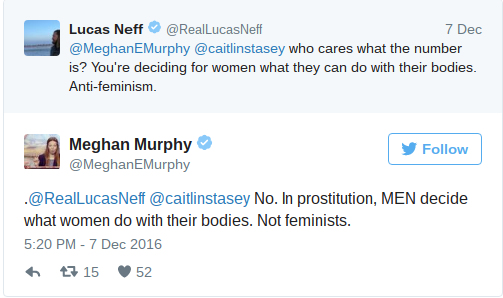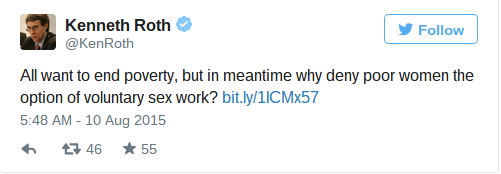via ‘Everybody’s doing it!’ and other bad arguments in defense of prostitution
‘Everybody’s doing it!’ and other bad arguments in defense of prostitution



Choices rarely happen in a vacuum. The post-modern way of thinking that all things are relative and valid depending on one’s point of view troubles me greatly. Like anyone I live with contradiction and paradox in what I think and feel. But I would not leave legislation to ambivalence, more importantly I would not leave legislation to those who are impacted by it least. My experiences in fully decriminalised, legal and illegal prostitution are held up constantly as anecdotal and dismissed as nothing more. If my experiences were that of a minority, that would be fair enough, but they aren’t. My experiences are reflected in varying degrees of cruelty, torture and coercive circumstances, in the majority of currently and formerly prostituted women
Due to the preponderance of ‘sex worker rights are human rights’ chants being reflected in the media it is understandable that many people outside of the sex trade…
View original post 1,748 more words
On 24 August 2015, I published What Amnesty Did Wrong in which I laid out many errors that Amnesty made in developing its proposal for the full decriminalisation of all aspects of “consensual sex work”. This proposal had been passed as a resolution at a meeting of the International Council in Dublin two weeks earlier (referred to as “the resolution” in this article).
In September, members of an internal Amnesty USA discussion forum requested that Amnesty USA respond to all of the points that I raised in that article. On 22 September 2015, Terry Rockefeller replied to the forum on “behalf of the Board and the Priorities Subcommittee” declining to respond to the article because it was “filled with errors and rumors”. She failed to explain who made the errors or what she consider to be rumours. I believe Amnesty needs to clarify…
View original post 4,850 more words
The Argument
“The Nordic model? It won’t work. You can’t decriminalize women and girls but criminalize the men who buy sexual access to them. It drives prostitution underground and puts them at risk of violence. Decriminalize ALL aspects of the sex trade to protect women and girls against violence and exploitation.”
Human rights group Amnesty International is currently risking everything it stands for to endorse The Argument. But if The Argument is true, why do violent and exploitative men want decriminalization?
LikeRedHeads
‘LikeRedHeads’ is the name used by a man on the Toronto Escort Review Boards (TERB). He has written over 1000 posts on the site, including reviews of the women he pays for.
He is John No.9 in The Invisible Men Project (Canada). [Read the full review here]

If the Nordic model would just facilitate him doing this to women, and full decriminalization would stop him – he must support the Nordic model. Right?
Actually…
1. He petitioned against…
View original post 1,068 more words

Amnesty International is Missing the Point
On August 11, 2015, Amnesty International voted to promote the decriminalization of prostitution. Their intentions are good (we hope), but I fear Amnesty International is not looking at the bigger picture, and thus is promoting a system that keeps “women in their place” worldwide. Their reasoning is that if prostitution is legal, theoretically prostitutes would have access to protection and rights they didn’t have before. Sounds great. Too bad it’s not the whole story.
So much attention has been paid to “sex workers’ rights” in the last several years. On the one hand, this is a good development. People working in the sex industry have traditionally been at the bottom of the totem pole, so to speak–the last people whose rights would be considered. So the dissemination of the ideas that sex workers are people of value and that they should enjoy the same rights and protections as anyone else is important and long overdue. With sex workers’ rights promotion, however, inherently comes an approval of and social legitimization of the commercial sex industry.
Some people have a problem with the sex industry because it promotes promiscuity, behavior they believe to be incompatible with God’s will. Some people have a problem with the sex industry because it warps one’s ability to have real romantic relationships. Some people have a problem with the sex industry because of the public health risks. These are points you may consider at your leisure, but the problem with the sex industry I would like to highlight is that it keeps women in a position of subjugation, objectification, and subservience.
Nowhere is it clearer than in the sex industry that men’s desires and needs are valued more than women’s. Although the sex industry is made up of men, women, and children, the vast majority is and has always been comprised of women. Let’s take a moment to think: why is that the case? Men have a higher sex drive, you say? Women are so much more desirable than men? It’s a function of evolution and the drive to reproduce?
I’ve heard all of the arguments. And ok, fine. Men have a higher sex drive, etc. But why is the notion that men get to have what they want (no matter the reason) so widespread? Taken for granted even. “Prostitution will never go away,” I’ve been told. Perhaps. But why? Because men have come to believe that they have a right to be sexually satisfied and their right to be satisfied is more important than a woman’s right to dignity and body boundaries.
Another reason prostitution may never go away is that women traditionally have had few other options. I have spoken with several women who were coerced into the sex industry when they were teenagers. They were managed by pimps for a time, but even after they were no longer under the rule of a pimp they chose to stay in prostitution. They said they felt they could make more money doing that than any other job they could think of. Being systematically raped every day felt more feasible than college and career. Ken Roth, Director of Human Rights Watch, recently tweeted, “All want to end poverty, but in meantime why deny poor women the option of voluntary sex work?” How magnanimous of you, Ken Roth. Poor women everywhere thank you for the permission to sell their bodies for a living.

Jokes aside, this is another example of not looking at the big picture, of not focusing on the most beneficial solutions. Human rights groups should divert the energy they are putting into promoting a system that devalues, dehumanizes, and disempowers women, into dismantling that system in a nuanced way. No method of approaching prostitution is perfect, but the best I’ve seen is the Nordic Model. This model still tries to discourage the sex industry by criminalizing pimps, brothel owners, and johns. This model says to pimps and johns, “we don’t condone prostitution and we know that targeting you is the way to reduce it.” At the same time, the Nordic Model decriminalizes sex workers. The point of this is that many of the people in the sex industry are there because they have been coerced, forced, or because they feel they have no other choice. Criminalizing them disenfranchises them further. Decriminalizing them also encourages law enforcement to stop arresting prostitutes (mostly women) and start arresting pimps and johns (mostly men).
When it comes right down to it, if Amnesty International was interested in protecting women, they would spend more time on challenging the belief that makes prostitution flourish in the first place: that men are more important than women.